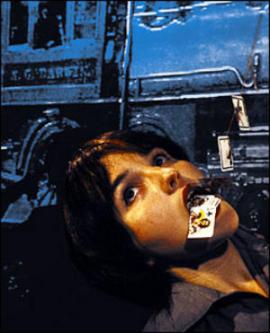Road to Morocco
Cynthia Hopkins Sings her Way through Memory’s Labyrinth
By Daniel Mufson
Originally published in The Village Voice, 30 Mar. 2004.

Hopkins Grapples with a Tough Hand. Photo: Arts St. Ann’s.
Toward the end of Accidental Nostalgia: An Operetta About the Pros and Cons of Amnesia, narrator Cameron Seymour (Cynthia Hopkins) wonders if she should track down the evil foster father she had mistakenly left for dead or just move on, forging a new identity for herself as a Sufi in Morocco: “I could investigate the dismal truth, or I could create a beautiful fiction.”
Seymour opts for the latter, and Hopkins, the writer and composer who created her, makes a similar choice. Just as Seymour opts to “fuck revenge” and run off to an exotic land, Hopkins ditches the sentimentalism and self-pity that usually accompany stories of dysfunctional childhoods and takes her audience on a fantastical journey. The operetta begins with a pseudo-scientific discourse on repressing memories, but the lecture mutates into autobiography, at turns confessional, clinical, and mystical. Accidental Nostalgia offers a perverse delight of incongruities-first and foremost, a narrative of childhood molestation delivered via stoical PowerPoint presentation and “alt-country” songs that range in tone from pensive to nonchalant. Expertly played by her band, Gloria Deluxe, the music has a veneer of folksy simplicity, but Hopkins juxtaposes a line like “I wanna dance until I forget myself” with “I wanna rail against impermanence.” Hopkins’s strong, flexible voice, reminiscent of half a dozen other singers but derivative of none, helps her pull off such swings in diction with apparent effortlessness.
Gloria Deluxe’s arrangements incorporate violin, bass, drums, and slide trombone, and even mix in spoons and rhythmic tearing of sheets of paper. In contrast to the low-tech music, Jeffrey Sugg and Jim Findlay’s scenic design features some of the duo’s favorite tricks previously seen in their work with Collapsable Giraffe and others; they especially love superimposing live and recorded images to create video composites. The downtown use of video has occasionally seemed less like an artistic choice and more like technophilic habit, but here Sugg and Findlay mirror the way memory itself creates composites of information that may be true, false, or somewhere in-between.
Accidental Nostalgia more than holds its own against other recent works dealing with memory loss, from Rinde Eckert’s operetta And God Created Great Whales to films such asEternal Sunshine of the Spotless Mind. Hopkins’s subtitle refers to “the Pros and Cons of Amnesia,” and another of her show’s striking qualities is the consideration of amnesia’s liberating potential. That said, the piece closes with Hopkins dressed in flowing Moroccan garb, wrapping black cloth around her head, literally and figuratively effacing herself-one of a number of images that will haunt the audience long after the lights have faded to black.